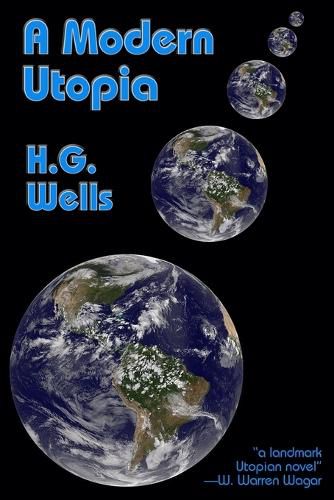Readings Newsletter
Become a Readings Member to make your shopping experience even easier.
Sign in or sign up for free!
You’re not far away from qualifying for FREE standard shipping within Australia
You’ve qualified for FREE standard shipping within Australia
The cart is loading…






This title is printed to order. This book may have been self-published. If so, we cannot guarantee the quality of the content. In the main most books will have gone through the editing process however some may not. We therefore suggest that you be aware of this before ordering this book. If in doubt check either the author or publisher’s details as we are unable to accept any returns unless they are faulty. Please contact us if you have any questions.
A Modern Utopia is one of H.G. Wells’ explorations of social problems set in the form of a novel, but it is more a complex investigation of what might be than a mere fictional story.
The unnamed narrator and a traveling companion find themselves on a parallel Earth, where the geology, biology, and very people are duplicates of those we know. They differ, however, in their outlook on life, methods of living and organizing themselves, and many other sociological issues. Through the eyes of the two we recognize (and their doppelgangers on this other Earth), we explore the possibilities provided in Wells’ utopian society, where people work for the common betterment, rather than personal enrichment.
Complex, visionary, and thought-provoking, author Joseph Conrad complained of the book that Wells did not take sufficient account of human imbecility which is cunning and perfidious.
British author Herbert George Wells (1866-1946) was at home in many genres, including history, politics, and social commentary, as well as the fiction for which he is best remembered today. He was one of the fathers of modern science fiction, and was nominated for the Nobel Prize in Literature four times (in 1921, 1932, 1935, and 1946). He is the author of such enduring classics as The Time Machine (1895), The Island of Doctor Moreau (1896), The Invisible Man (1897), and The War of the Worlds (1898).
A Modern Utopia is an early one of the 50 novels–and an even greater number of nonfiction works–H.G. Wells produced during a writing career that spanned decades. His first novel, The Time Machine, appeared in 1895, while his last followed in 1941, You Can’t Be Too Careful. His non-fiction books debuted with a Text-Book of Biology in 1893, through a discussion of Marxism vs Liberalism in 1945.
$9.00 standard shipping within Australia
FREE standard shipping within Australia for orders over $100.00
Express & International shipping calculated at checkout
This title is printed to order. This book may have been self-published. If so, we cannot guarantee the quality of the content. In the main most books will have gone through the editing process however some may not. We therefore suggest that you be aware of this before ordering this book. If in doubt check either the author or publisher’s details as we are unable to accept any returns unless they are faulty. Please contact us if you have any questions.
A Modern Utopia is one of H.G. Wells’ explorations of social problems set in the form of a novel, but it is more a complex investigation of what might be than a mere fictional story.
The unnamed narrator and a traveling companion find themselves on a parallel Earth, where the geology, biology, and very people are duplicates of those we know. They differ, however, in their outlook on life, methods of living and organizing themselves, and many other sociological issues. Through the eyes of the two we recognize (and their doppelgangers on this other Earth), we explore the possibilities provided in Wells’ utopian society, where people work for the common betterment, rather than personal enrichment.
Complex, visionary, and thought-provoking, author Joseph Conrad complained of the book that Wells did not take sufficient account of human imbecility which is cunning and perfidious.
British author Herbert George Wells (1866-1946) was at home in many genres, including history, politics, and social commentary, as well as the fiction for which he is best remembered today. He was one of the fathers of modern science fiction, and was nominated for the Nobel Prize in Literature four times (in 1921, 1932, 1935, and 1946). He is the author of such enduring classics as The Time Machine (1895), The Island of Doctor Moreau (1896), The Invisible Man (1897), and The War of the Worlds (1898).
A Modern Utopia is an early one of the 50 novels–and an even greater number of nonfiction works–H.G. Wells produced during a writing career that spanned decades. His first novel, The Time Machine, appeared in 1895, while his last followed in 1941, You Can’t Be Too Careful. His non-fiction books debuted with a Text-Book of Biology in 1893, through a discussion of Marxism vs Liberalism in 1945.